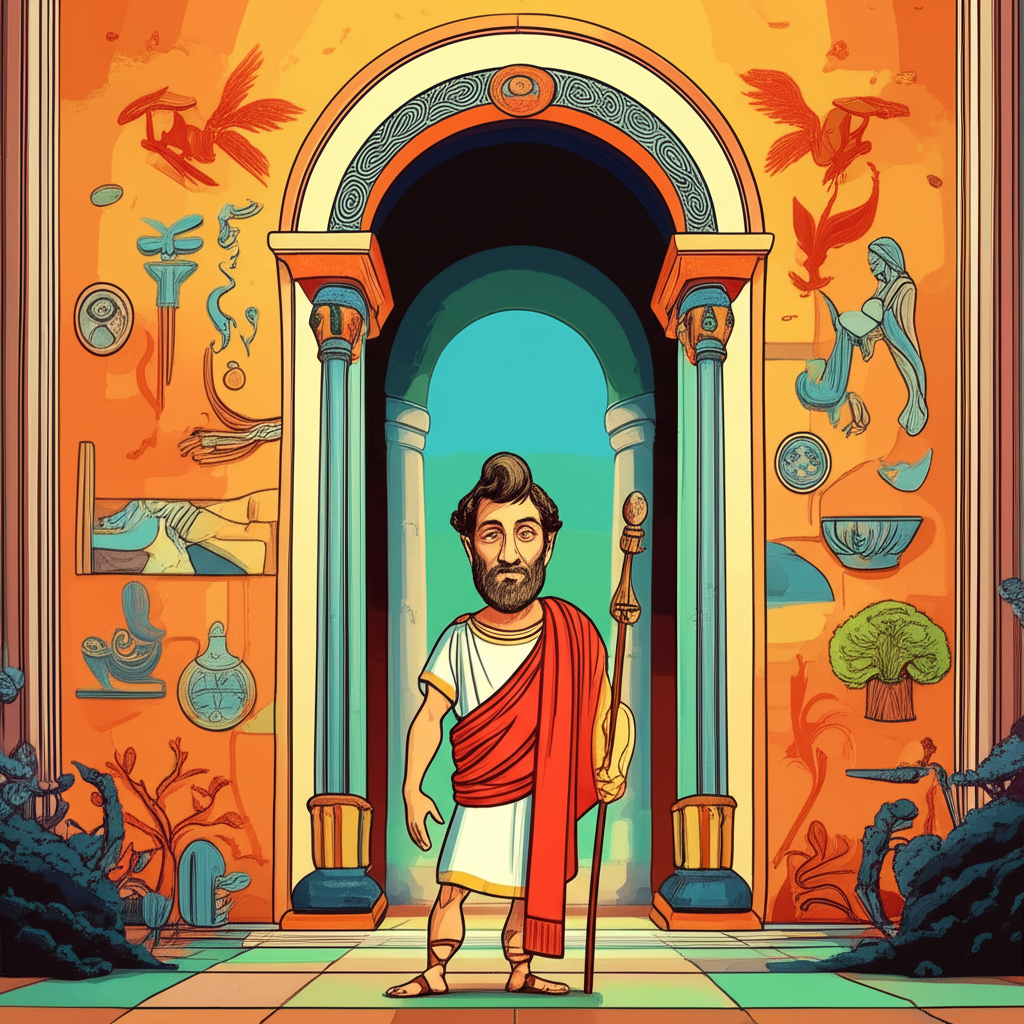
1. Introduction
The annals of ancient Greek mythology are rich with tales of gods, heroes, and mortals whose lives intertwine in epic sagas, shaping the very fabric of the cosmos as perceived by the people of antiquity. Among these narratives is the dramatic account of the Judgment of Paris, a pivotal event that ignited the legendary Trojan War. Within this intricate tapestry of divine vanity and human folly, one figure, often overlooked, stands as a quiet counterpoint: Hestia, the goddess of the hearth. It is important to remember that this narrative, like all myths, is a traditional story passed down by ancient people, a product of their imagination and worldview, not a factual account or a basis for belief or practice. It offers us a window into their cultural heritage and understanding of the world.
2. Origins and Cultural Background
This myth originates from ancient Greece, flourishing during a period stretching from the Bronze Age (Mycenaean civilization) through the Archaic and Classical eras. It was a society deeply rooted in oral tradition, where stories of gods and heroes were recited by bards, depicted in art, and performed in dramas, serving as both entertainment and instruction. The Greeks lived in independent city-states, or poleis, each with its own patron deities and local cults, yet united by a shared pantheon and mythological heritage.
For the people of that time, the world was a vibrant, often volatile, realm where powerful, anthropomorphic gods and goddesses actively intervened in human affairs. These deities, residing on Mount Olympus, mirrored human emotions—love, jealousy, anger, ambition—but on a grander, more powerful scale. They were believed to control natural phenomena, dictate destinies, and embody various aspects of human experience, from war and wisdom to love and agriculture. Life was seen as interwoven with the divine, and understanding the whims and relationships of the gods was crucial to navigating one’s existence. Myths like the Judgment of Paris provided explanations for suffering, conflict, and the very nature of heroism and tragedy, shaping moral understanding and communal identity.
3. Character Descriptions: The Hearth and the Discord
At the heart of our story, though often in the background of the great conflicts, is Hestia. She is described in mythology as the eldest child of Cronus and Rhea, a sister to Zeus, Hera, Poseidon, Hades, and Demeter. Unlike her more flamboyant siblings, Hestia is the goddess of the hearth, home, domesticity, and the sacred fire. Her symbolic attributes are profound: a simple veil, a staff, and the ever-burning flame. She represents stability, warmth, sanctuary, and inner peace. Hestia famously took a vow of eternal virginity, a testament to her self-sufficiency and detachment from the romantic entanglements and power struggles that often plagued the other Olympians. She rarely left Mount Olympus, preferring to tend to the sacred flame of the hearth, a symbol of the communal and familial center. Her presence signifies order, purity, and the quiet, essential foundations of civilization.
In stark contrast to Hestia’s serene nature, the catalyst for the Trojan War was Eris, the goddess of discord and strife. Often depicted with tangled hair and a sneering countenance, Eris embodies chaos and malicious mischief. She thrives on provoking arguments and spreading ill will, a disruptive force that revels in disunity.
The principal contenders in the fateful judgment were three powerful goddesses:
- Hera: Queen of the gods, wife of Zeus, and goddess of marriage and childbirth. She is characterized by her regal bearing, fierce loyalty (to herself and her status), and notorious jealousy. She desired the golden apple as a confirmation of her supreme authority.
- Athena: Goddess of wisdom, strategic warfare, and crafts. Born from Zeus’s head, she is often depicted in armor, bearing a shield and spear. She represents intellect, tactical prowess, and justice (though often from her own perspective). She sought the apple as recognition of her unparalleled wisdom and might.
- Aphrodite: Goddess of love, beauty, pleasure, and procreation. Often depicted in alluring form, she wields immense power through attraction and desire. She yearned for the apple as an affirmation of her unmatched physical charm.
Finally, there was Paris, a Trojan prince, fated to be the judge. He was a shepherd by upbringing, skilled in archery, but ultimately a mortal swayed by the allure of power, wisdom, and especially, beauty.
4. The Main Story: The Golden Apple and the Fateful Choice
The grand narrative begins not with war, but with a wedding – the joyous union of the mortal hero Peleus and the sea nymph Thetis. All the gods and goddesses of Olympus were invited, except for one: Eris, the goddess of discord. True to her nature, Eris, seething with resentment at the snub, resolved to sow chaos. As the celebration reached its zenith, she dramatically tossed a golden apple inscribed with the words "To the Fairest" onto the banquet table, then vanished into the shadows.
Immediately, a heated argument erupted among the goddesses. Hera, Athena, and Aphrodite each claimed the apple, believing themselves to be the rightful recipient. Their squabbling grew so intense that Zeus, weary of their bickering and unwilling to offend any of his powerful relatives, refused to make the judgment himself. Instead, he decreed that a mortal, Paris, prince of Troy, would decide. Paris, though a prince, had been sent away to live as a shepherd due to a prophecy that he would cause the downfall of Troy.
The three goddesses, escorted by Hermes, descended from Olympus to Mount Ida, where Paris tended his flocks. Each goddess, eager to secure the apple, offered Paris an irresistible bribe. Hera promised him power and dominion over all of Asia, making him the richest and most powerful king in the world. Athena offered him unparalleled wisdom and skill in battle, guaranteeing him victory in every conflict. Aphrodite, however, offered him the most beautiful woman in the world as his wife.
Paris, a young man swayed by earthly desires, chose Aphrodite. His decision, driven by the promise of ultimate beauty, came at a terrible price. The most beautiful woman in the world was Helen, wife of Menelaus, King of Sparta. With Aphrodite’s aid, Paris journeyed to Sparta, where he abducted Helen, spiriting her away to Troy. This act of profound disrespect and betrayal ignited the wrath of Menelaus and his brother Agamemnon, leading to the rallying of all the Greek city-states and the launching of a thousand ships towards Troy – thus beginning the infamous Trojan War.
Throughout this entire tumultuous chain of events, Hestia remained steadfastly at her post on Mount Olympus, tending the sacred hearth. She was neither invited to the wedding by Eris (as Eris only targeted the ‘fairer’ goddesses, not the un-controversial Hestia) nor did she participate in the contest for the golden apple. Her character, dedicated to purity and domestic harmony, was antithetical to the vanity and conflict embodied by the other goddesses. While the world outside her hearth descended into war, she represented the unwavering, silent core of peace and order. Her absence from the Judgment of Paris, and from the subsequent destructive conflict, speaks volumes about her nature and the values she embodied.
5. Symbolism and Meaning
To the ancient Greeks, the myth of the Judgment of Paris and the subsequent Trojan War was far more than an exciting story; it was imbued with profound symbolism. The golden apple and the contest among the goddesses represented the destructive nature of vanity, jealousy, and superficial judgments. It highlighted how personal desires and flawed choices, even by divine beings, could have catastrophic consequences for mortals. The war itself symbolized the futility and suffering inherent in conflict, driven by pride, honor, and the pursuit of perceived slights.
Hestia’s role, or rather her non-role, in this epic drama is particularly significant. She represents the quiet virtues of domesticity, community, and inner peace, standing in stark contrast to the chaos and external validation sought by Hera, Athena, and Aphrodite. Her refusal (or rather, her inherent disinterest) to participate in the contest for "the fairest" signifies a profound wisdom—a recognition that true value lies not in external accolades or physical beauty, but in the warmth of the home, the sanctity of the family, and the steadfastness of one’s own character. Hestia embodied the stability that the Greeks sought in their homes and cities, a refuge from the constant strife and upheaval of the world, whether mortal or divine. Her unmoving presence at the hearth represented the enduring spirit of community and the essential need for a stable, internal center amidst external turmoil.
6. Modern Perspective
Today, the myth of the Judgment of Paris and the Trojan War continues to resonate deeply within our cultural consciousness. It is frequently reinterpreted in literature, where authors explore themes of fate, free will, heroism, and the devastating costs of war. Movies and television series often adapt or draw inspiration from the epic, focusing on the dramatic love triangle, the strategies of battle, or the psychological complexities of its characters. Video games transport players to ancient Troy, allowing them to experience the legendary conflict firsthand.
In cultural studies, the myth is examined for its insights into gender roles, power dynamics, and the origins of conflict. Hestia, too, has found new appreciation. Her archetype is explored in psychological studies, particularly Jungian analysis, where she represents the inner hearth, the self-contained psyche, and the importance of cultivating one’s inner sanctuary. She is seen as a symbol of grounding, mindfulness, and finding fulfillment within oneself, rather than through external validation or competition. Modern interpretations often highlight her quiet strength as a powerful alternative to the aggressive, outward-focused pursuits of her Olympian peers, offering a timeless message about the value of peace and contentment.
7. Conclusion
The tale of Hestia and the War of the Judgment of Paris, like all ancient myths, is a profound testament to the human imagination and our enduring quest to understand the world and our place within it. It is a cultural story, passed down through generations, offering insights into the values, fears, and aspirations of the people who first told it. As Muslims, we recognize that only Allah is the true Creator and Sustainer, and these ancient narratives are products of human thought, not divine revelation.
Nevertheless, such stories form an invaluable part of our global cultural heritage. They teach us about the diverse ways humanity has sought meaning, explored morality, and grappled with the complexities of existence through the power of narrative. The myth of Hestia and the Judgment of Paris reminds us of the timeless contrast between destructive ambition and quiet peace, and the enduring power of storytelling to reflect the human condition, provoke thought, and inspire reflection across the ages.




